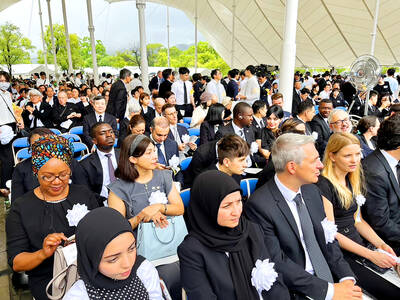Polish President Lech Kaczynski and some of the country’s highest military and civilian leaders died yesterday when the presidential plane crashed as it came in for a landing in thick fog in western Russia, killing 96, officials said.
Russian and Polish officials said there were no survivors on the Soviet-era Tupolev, which was taking the president, his wife and staff to events marking the 70th anniversary of the massacre of thousands of Polish officers by Soviet secret police.
On board were the army chief of staff, national bank president, deputy foreign minister, army chaplain, head of the National Security Office, deputy parliament speaker, civil rights commissioner and at least two presidential aides and three lawmakers, the Polish foreign ministry said.
Russia’s Emergency Ministry said there were 96 dead, 88 part of a Polish state delegation. Poland’s Foreign Ministry spokesman, Piotr Paszkowski, said there were 89 people on the passenger list but one person had not shown up for the flight from Warsaw’s main airport.
“We still cannot fully understand the scope of this tragedy and what it means for us in the future. Nothing like this has ever happened in Poland,” he said. “We can assume with great certainty that all persons on board have been killed.”
State news channel Rossiya-24 showed footage from the crash site, with pieces of the plane scattered widely amid leafless trees and small fires burning in woods shrouded with fog.
The presidential Tu-154 was at least 20 years old. Polish officials have long discussed replacing the planes that carry the country’s leaders, but said they lacked the funds. According to the Aviation Safety Network, there have been 66 crashes involving Tu-154s, including six in the past five years. The Russian carrier Aeroflot recently withdrew its Tu-154 fleet from service.
Polish-Russian relations had been improving of late after being poisoned for decades over the Katyn massacre.
Russian Prime Minsiter Vladimir Putin has been put in charge of a commission investigating the crash, the Kremlin said.
In Warsaw, Polish Prime Minister Donald Tusk called an extraordinary meeting of his Cabinet and the national flag was lowered to half-staff at the presidential palace, where people gathered to lay flowers and light candles.
Poland’s president is commander in chief of its armed forces, but the position’s domestic duties are chiefly symbolic.
Kaczynski, 60, became president in December 2005 after defeating Tusk in the presidential vote.
The nationalist conservative was the twin brother of Poland’s opposition leader, former prime minister Jaroslaw Kaczynski.
In Taiwan, Ministry of Foreign Affairs Deputy Spokesman James Chang (章計平) said Taiwan’s representative office in Poland has sent Taiwan’s condolences from President Ma Ying-jeou (馬英九) to Poland’s acting president Bronislaw Komorowski.
ADDITIONAL REPORTING BY SHIH HSIU-CHUAN

DEFENSE: The first set of three NASAMS that were previously purchased is expected to be delivered by the end of this year and deployed near the capital, sources said Taiwan plans to procure 28 more sets of M-142 High Mobility Artillery Rocket Systems (HIMARS), as well as nine additional sets of National Advanced Surface-to-Air Missile Systems (NASAMS), military sources said yesterday. Taiwan had previously purchased 29 HIMARS launchers from the US and received the first 11 last year. Once the planned purchases are completed and delivered, Taiwan would have 57 sets of HIMARS. The army has also increased the number of MGM-140 Army Tactical Missile Systems (ATACMS) purchased from 64 to 84, the sources added. Each HIMARS launch pod can carry six Guided Multiple Launch Rocket Systems, capable of

TRAJECTORY: The severe tropical storm is predicted to be closest to Taiwan on Wednesday and Thursday, and would influence the nation to varying degrees, a forecaster said The Central Weather Administration (CWA) yesterday said it would likely issue a sea warning for Tropical Storm Podul tomorrow morning and a land warning that evening at the earliest. CWA forecaster Lin Ting-yi (林定宜) said the severe tropical storm is predicted to be closest to Taiwan on Wednesday and Thursday. As of 2pm yesterday, the storm was moving west at 21kph and packing sustained winds of 108kph and gusts of up to 136.8kph, the CWA said. Lin said that the tropical storm was about 1,710km east of Oluanpi (鵝鑾鼻), Taiwan’s southernmost tip, with two possible trajectories over the next one

Tropical Storm Podul strengthened into a typhoon at 8pm yesterday, the Central Weather Administration (CWA) said, with a sea warning to be issued late last night or early this morning. As of 8pm, the typhoon was 1,020km east of Oluanpi (鵝鑾鼻), Taiwan’s southernmost tip, moving west at 23kph. The storm carried maximum sustained winds of 119kph and gusts reaching 155kph, the CWA said. Based on the tropical storm’s trajectory, a land warning could be issued any time from midday today, it added. CWA forecaster Chang Chun-yao (張竣堯) said Podul is a fast-moving storm that is forecast to bring its heaviest rainfall and strongest

CRITICISM: It is deeply regrettable that China, which is pursuing nuclear weapons, has suppressed Taiwan, which is pursuing peace, a government official said Representative to Japan Lee Yi-yang (李逸洋) yesterday accused Beijing of interference after Taiwan’s official delegation to the Nagasaki Peace Memorial Ceremony in Japan was assigned seating in the “international non-governmental organizations [NGO]” area. “Taiwan is by no means an international NGO, but a sovereign nation that is active on the international stage,” Lee said. Lee and Chen Ming-chun (陳銘俊), head of the Taipei Economic and Cultural Office (TECO) in Fukuoka, attended the ceremony in Nagasaki yesterday, which marked the 80th anniversary of the atomic bombing of the city. That followed Lee’s attendance at the Hiroshima Peace Memorial Ceremony on Wednesday